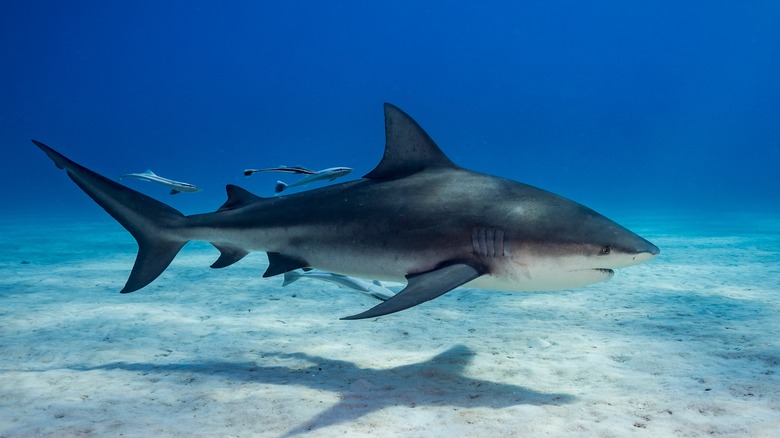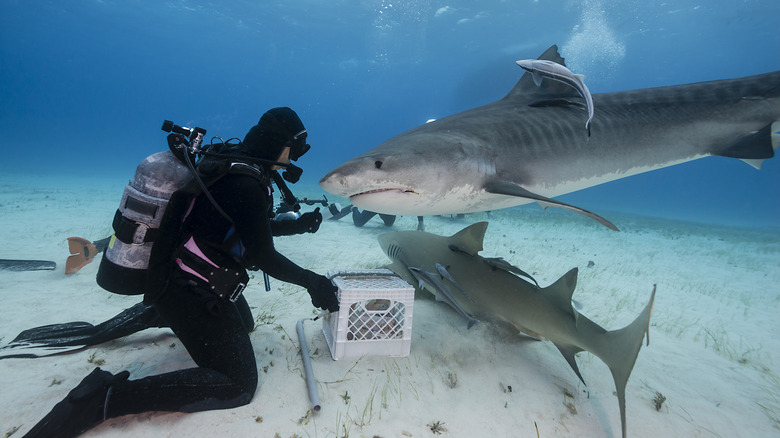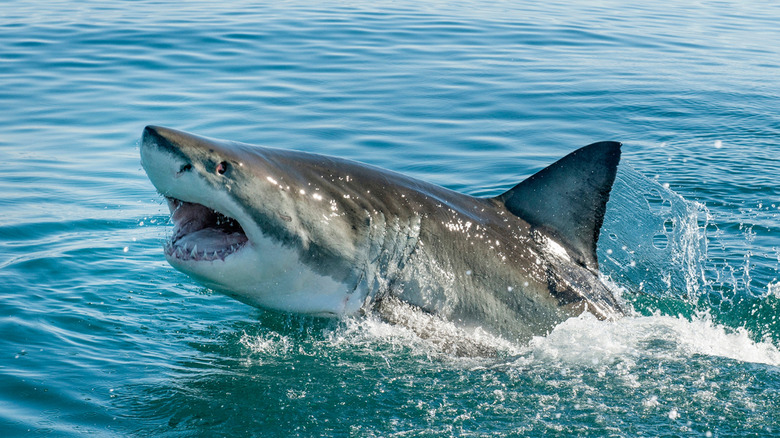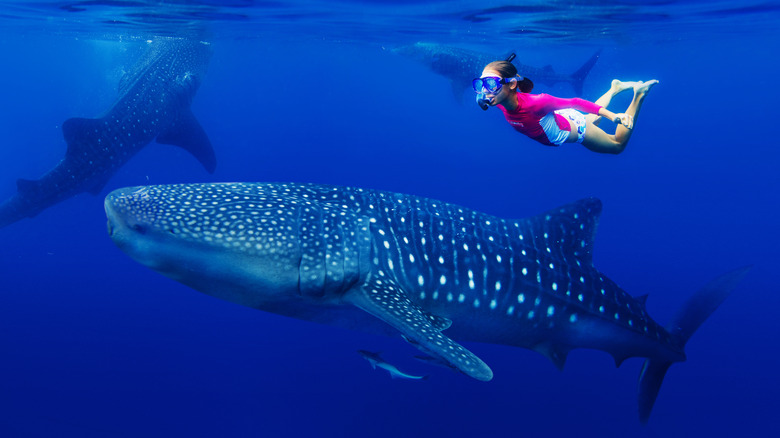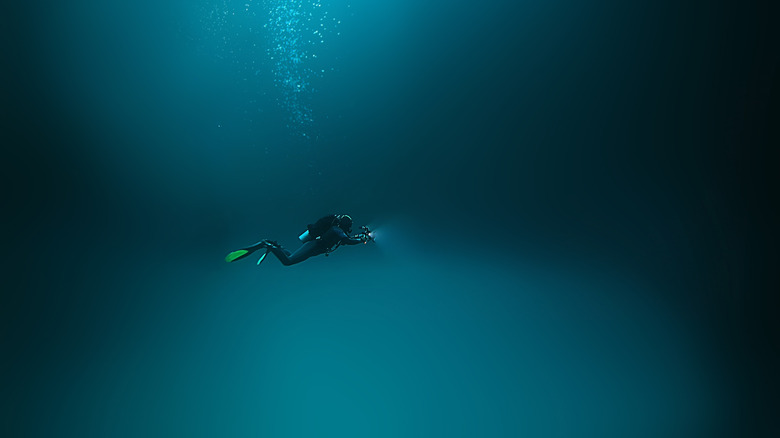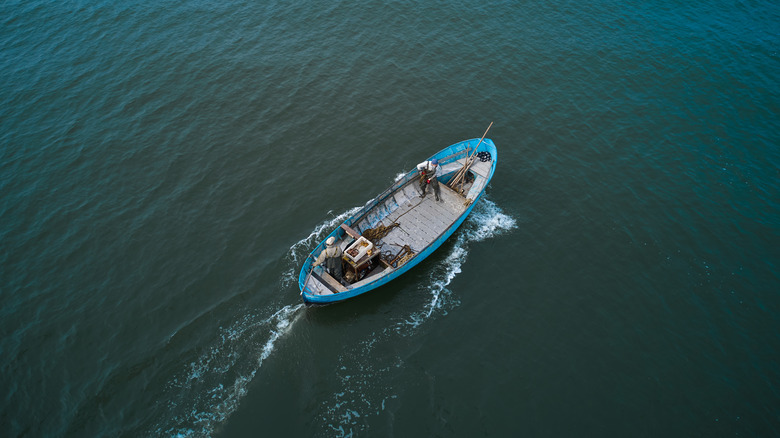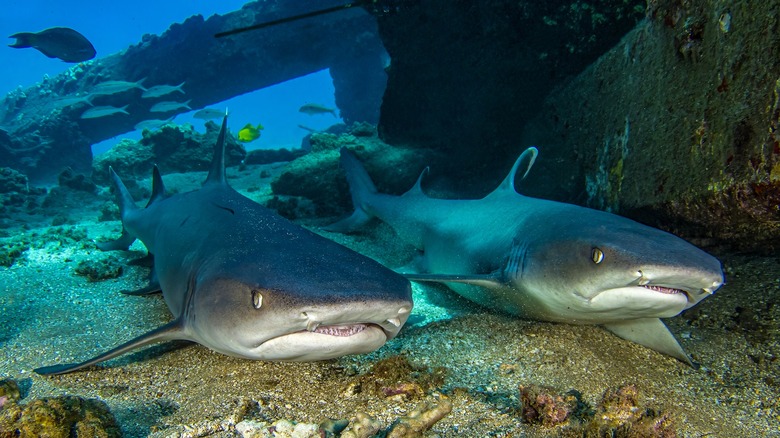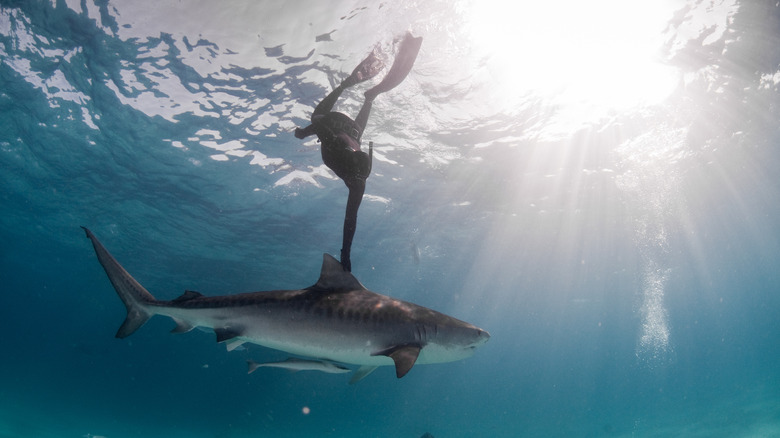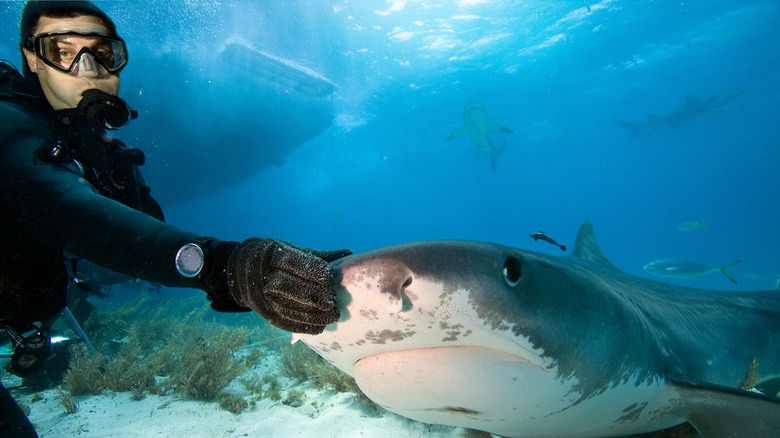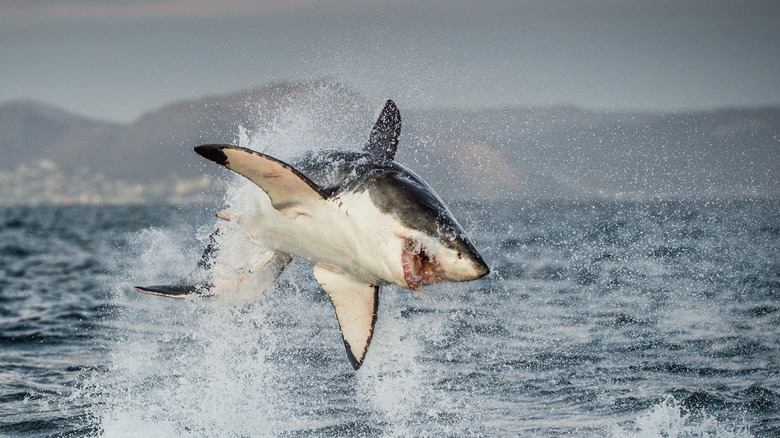9 Times Sharks Were The Good Guys
When it comes to the animal kingdom, no one gets worse PR than sharks. Heck, lions get to be the kings of the jungle, and they don't even live in jungles! The only thing sharks get to rule are our collective nightmares. A lot of that reputation can be traced back to the 1976 blockbuster "Jaws."
So how many humans do these murder machines take down annually? Hundreds? Thousands? Yeah -– how about five? That's right. Five. For Pete's sake, cows kill twenty two people a year, and yet Animal Planet hasn't dedicated a week of programming to them. While most articles about sharks paint them as piles of teeth coming for your children, no one seems to ever mention all the ways these ferocious fish have helped us out over the years. So, here are just a few feel good stories sharks need to push when they throw their own Shark Week celebration.
VETS ARE DIVING WITH SHARKS TO HELP WITH PTSD
You'd think swimming with sharks would lead to high therapy bills. But for a group of veterans, the sharks are providing the therapy itself. Fox News explains that the Point Defiance Zoo & Aquarium in Tacoma, Washington, helps soldiers suffering from depression, pain, and PTSD by dropping them into some seriously shark-infested waters.
Known as Operation Shark Dive, the program allows soldiers to scuba dive inside the aquarium's 225,000-gallon shark exhibit, along with 16 exceptionally patriotic sharks. The swim lets vets process the natural emotions of coming face to face with these impressive animals, emotions similar to those faced on a battlefield, but within a safe environment. Well, as safe as you can be cavorting with enough sharks to fill out a basketball team.
In addition, the scuba equipment forces the veterans to use diaphragmatic breathing, a practice that's been shown to calm emotions and stabilize the heart rate. All in all, thanks to the forward thinking of Louis McGranaghan, chief physical therapist for JBLM's Warrior Transition Battalion, soldiers are turning most people's worst nightmare into a life-saving experience.
MAN DISCOVERS CANCER AFTER BEING ATTACKED BY SHARK
For most people, getting bitten by a shark would be one of the worst moments of their lives. But for Eugene Finney, it may have been the best thing to ever happen to him. The Washington Post tells the tale: back in 2015, Finney was enjoying a dip off a California beach with his daughter when he felt something slam into him. It took him nearly 24 hours to realize that the foot long wound on his back was the result of a run-in with a great white shark.
When he went to the hospital to have his injuries checked out, a CAT scan discovered something very unexpected. No, not a shark tooth embedded into his spine, but a tumor on his kidney. That's right, Finney had cancer, and never would have known it if not for his encounter with one very helpful shark. Now fully recovered, after having twenty percent of his kidney removed, Finney told The Washington Post, "If I could find this shark and give it a hug, I would."
SWIMMING WITH SHARKS SAVES SMALL TOWN
For the people of Donsol, a small coastal town in the Philippines, just surviving from one day to the next used to be a challenge. That is until Dave Duran, an environmentalist and photographer, came to town in the late '90s, and captured images of the rare whale sharks that lived just off shore.
Not long afterwards, the Philippines outlawed the hunting of whale sharks, and Donsol became a worldwide destination for people hoping to swim with the majestic animals. The economy boomed as a result, and became a symbol of how preservation can be a moneymaker.
Take it from Alan Amanse, (via CNN) a tour guide in the area, who struggled for years driving taxis and playing guitar in bars. Thanks to these massive animals, which can grow up to 65 feet long, Amanse has multiplied his income six times, and put his kids through school. While most people run when they hear there's sharks in the water, for the better part of two decades, people from all over the world have been running to this tiny fishing village, turning it into a poster child for eco-tourism in the process.
SHARK SIGHTING SAVES PANICKING DIVER
Most people would panic at being 40 meters down in the drink, unprepared and under siege from swarming sharks. But one lucky diver used the chance encounter to calm her nerves and save her life.
Caroline Spence wrote about her experience for The Guardian. By her own admission, Spence wasn't an expert diver when she decided to dive the Elphinstone Reef in the Red Sea. Knowing how anxious she was, her diving instructor promised they wouldn't go deeper than 30 meters down. And yet, halfway into her dive, she looked at her gauge and read it with astonishment. She was 40 meters deep, and scared out of her mind.
In a panic, she started swimming towards the surface, but spotted a white tip shark, and then a cooper shark. They were everywhere, stopping her in her tracks, and probably saving her life in the process. While sharks can be scary, they rarely attack humans. The bends, however, are a real danger to any diver. If Spence had rushed to the surface, her lungs could have ruptured, killing her instantly.
Thankfully, those sharks kept her in her place, and allowed her to regroup. Sure, she ran out of air, but was able to buddy-breathe with her guide, and make it back to the surface with functioning lungs and no shark bites. Spence stopped diving shortly after that, but has always been grateful to those sharks, who saved her life without even knowing it.
A SHARK SAVED A MAN LOST AT SEA
What started out as a leisurely boat ride nearly ended in two mens' deaths. It was only through the intervention of a very friendly shark that one of them made it home alive.
According to Time, back in 2010, Toakai Teitoi of Kiribati, an island 2,500 miles southwest of Hawaii, joined his brother-in-law Lelu Falaile, on a 15-foot wooden boat that the two planned to pilot back to Teitoi's hometown.
Unfortunately for them, a laid-back afternoon of fishing took a turn for the worse when they realized they'd run out of water and gas. The men were soon pulled deep into the Pacific Ocean, where they drifted for another 38 days, until Teitoi's brother-in-law died from exposure.
After a burial at sea, Teitoi kept floating, now lost for five weeks. Filled with despair, the aspiring police officer drifted in and out of consciousness. It was only a violent thud that awoke him in time to spot a rescue boat. That thud came from a six foot shark — one that Teitoi is convinced was trying to lead him to safety.
Now back home, Teotoi knows that if it weren't for the gesture of one kind-hearted shark, he would have never made it off that boat alive.
SHARKS KEEP CIRCLE OF LIFE CIRCLING
Sharks may give you nightmares, but chances are we're keeping them up at night too. Well, if they sleep, which is sort of a question mark. Thanks to excessive shark hunting, which feeds our desire for everything from shark fin soup to shark cartilage pills, shark populations are seriously declining. And that's a big problem. Sharks are part of the food chain, and when one link in that chain is broken, the whole thing falls apart.
This is how the ocean works. The seabed is covered with phytoplankton, a tiny life form that sucks up carbon dioxide and releases oxygen. But without sharks to eat the fish that then eat the plankton, the whole system gets knocked out of whack. Too many fish means not enough plankton, which means not enough oxygen.
Now, just do a test right now. What are you doing? Breathing, right? You can thanks sharks for that.
And it's not just air. For instance, according to Ecology.com, overfishing of sharks in Tasmania allowed the population of their main food source, the octopus, explode. Those octopuses ate too many lobsters and the local spiny lobster fishermen saw their industry collapse. Sharks may have a lot of teeth and star in some scary movies, but they're still a vital part of the equilibrium of life.
IDIOTS RIDE SHARKS, SHARKS DON'T EAT THEM
Look, sharks get a bad rap, but they sure do show a lot of restraint when it comes to one species in particular. Us. Well, you. Humans. Whether we're hunting them, or turning them into tourist bait, we seem determined to piss them off at every turn, and yet, they more often than not just take it.
That's how something called "shark riding" has become a trend in recent years, in large part due to a culture that would rather get the selfie than live to post it. What started out as conservationists trying to show that sharks were more than simply monsters of the deep has morphed into a money shot for thrill-seeking tourists.
The idea behind shark riding is fairly simple. A diver swims close enough to a shark to grab onto its dorsal fin, and then away these new friends go.
But the conservationists never expected these waterlogged bros to take things quite so far. For instance, a viral video from 2013 showed a diver in Bora Bora not only riding a shark, but giving it a giant bear hug. Judging by the responses on Facebook, which, according to Slate, called the guy everything from an idiot, to crazy, to deplorable, to dumb, there may still be some hope for mankind. Thanks anyway, sharks, for putting up with our crap.
SHARK AND MAN BECOME BEST FRIENDS
They say opposites attract, but diver Rick Anderson is putting that idiom to the test. For the better part of a decade, he's carried on a friendship with a shark off the coast of Port Macquarie, Australia.
As Anderson told The Dodo, "I started playing with her about seven years ago when she was just a pup about 6 inches long...I approached her carefully so as not to spook her, then began to gently pat her. Once she got used to me, I would cradle her in my hand and talk soothingly to her through my regulator."
Every summer he reconnects with the female Port Jackson shark, recognizing her by her markings and her obvious glee in seeing her human friend.
He told Mashable, "during the start of summer she would return to the reef we met and if we saw each other she would come for a pat and tickle, to the point that if I didn't notice her she would tap me on the legs until I turned around with my arms out and rest on them for a cuddle." Yes, a cuddle. These friends aren't afraid to show a little PDA, proving that friendships can arise in the least likely of places.
SHARK BIOLOGY LEADS TO MEDICAL BREAKTHROUGHS
Scientists have long been fascinated by the physiology of sharks. Here are animals that have been around, with few changes, for longer than trees. Yeah, you read that right. They're! They're clearly doing something right, and scientists have been eager to tap their secrets.
Researchers at The University of Aberdeen are looking into whether shark blood antibodies could help treat breast cancer, per CBS News. A Georgetown University Medical Center study is testing to see whether squalamine, a cholesterol-like compound found in dogfish sharks' tissue could treat a variety of viruses. A company called Ossianix is looking into whether shark antibodies can help break through the blood-brain barrier, a hereto-unbreakable membrane that's kept us from treating any number of brain-related issues. La Trobe University is now moving into human trials with their own shark antibodies that they hope will treat fibrosis of the lungs, kidneys, eyes, skin, liver and heart. There's even an Indiegogo campaign to raise money to see if shark blood can help treat brain diseases like Parkinson's and Alzheimer's.
All in all, while sharks may take a life here and there, they're on the verge of saving a thousand times that, meaning they just might deserve a surfer snack every now and again. Right?
